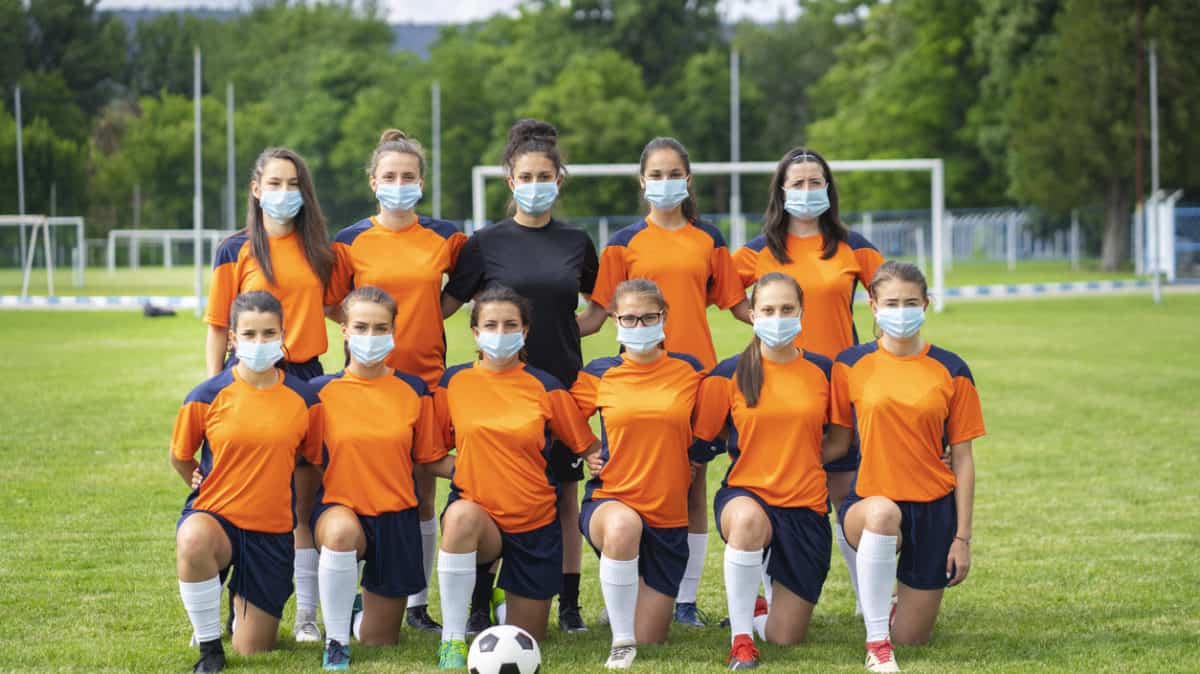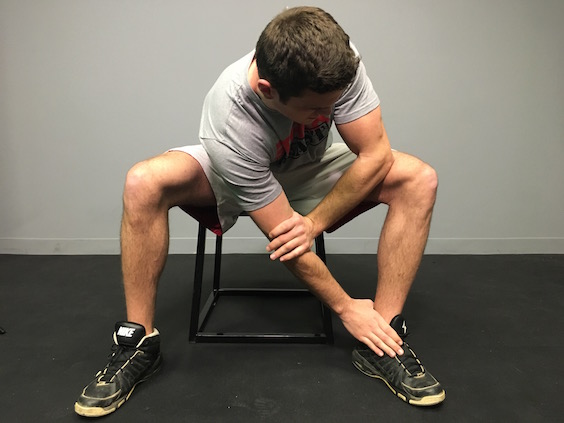The Common Mistake Behind Many Football Losing Streaks
For football teams around the country, it’s gut-check time.
From high school to pros, most teams now have a couple games under their belt. The excuse of “early season jitters” no longer cuts it.
Compared to other sports, football’s season is desperately short. One bad loss can have a big impact on the outcome of a season, while an extended losing steak will all but sink a team’s major aspirations.
Due to this limited number of games, football coaches are especially prone to panic when things go wrong. And often their default blame for a loss is that the other team was “tougher” or “wanted it more” than their own.
“I’ve been around football all my life, and it seems to me like 90% of all loses are blamed on effort, conditioning, ‘they wanted it more,’ all these things I think are just B.S. And that’s the default of football coaches” says Tony Holler, head track coach at Plainfield North High School (Illinois). “I’ve never really witnessed a low-effort football game. Kids, in my opinion, will always go out and try to win games.”
Holler is known for his Feed the Cats training philosophy, which eschews the typical “grind” mentality favored by many high school coaches for an undying devotion to quality over quantity. His number one priority for athletes in sports like track and football is rest and recovery. Number two is speed.
While Holler, who also has nearly 30 years of experience as a football coach, has seen several football teams adopt his methodologies, training to get tired is deeply ingrained in football tradition.
So when most teams lose, the coach’s first adjustment is to make them more tired during practice by beating the crap out of them the following week.
“It’s, ‘You’re going to regret losing. Because I’m going to punish your asses the next week,’” says Holler. “The idea that you’re going to double the practice time next week because you’re pissed at them for losing is, in my opinion, abusive. But it’s very baked into the football mentality.”
Many coaches will respond to a loss with longer practices, more conditioning, less rest and an increase in the volume of the most physically punishing drills. Maybe they’ll have to run a wind sprint for every point they gave up, or a Burpee for every yard. And maybe they’ll spend the entire week in full pads.
Harder, more physically exhausting practices in response to a loss is as much a football tradition as marching bands and homecoming games. Part of it is appearances—football coaches don’t want to be blamed for their team being unprepared or “soft,” so they grind them into dirt. No one who watches practice will be able to accuse them of not working hard enough.
This might be the “old school” or “traditional” response to a bad loss, but is it really the best approach?
Almost certainly not.
In fact, this type of response is what often causes one loss to snowball into a prolonged losing streak. Football teams who are already likely being run too much and worked too hard during the week to peak on game day are made to do more, thus they enter each subsequent game more exhausted than the last.
It’s a vicious cycle, and one that can destroy a team both physically and mentally. Holler relays a story of an NFL strength and conditioning coach who’d helped convince his team to invest in GPS technology a couple years ago to better optimize players’ practice loads. They were focusing more on rest and recovery and practicing at truly high speeds than they were pulverizing the players with overloading. And it was working, too—according to GPS data, many players were hitting speeds in excess of 20 mph in practice.
But it all went out the window after their first loss. The old-school head coach no longer cared about supporting high performance, instead reverting to mantras about “building toughness” and “not being outworked.” Suddenly, few players in practice were exceeding 14 mph in practice due to both fatigue and changes to the practice plan.
“(Coaches will say) game speed, game speed! As they’re trying to recover from a 3-hour practice the day before, they’re going through a 3-hour practice today, and doing warm-ups that are meant to get guys tired…(Some) modern football teams do punishment running or physical punishment on Mondays after losses or a certain number of things for every point scored,” says Holler.
“If we’re running around in third gear, we’re not preparing at all for game speed, fifth-gear work…And you can’t be if you do not lay the groundwork for a high-speed practice the day before.”
It’s one of Holler’s favorite sayings—“Never let today ruin tomorrow.” Responding to a loss by making players who are likely already entering games slightly to moderately fatigued (trust us, it’s more common than you think) work harder the following week is letting the practice week ruin game day.
So, what to do instead?
Getting to the right answer requires a more nuanced and open-minded approach. Perhaps the cure for what ails your team might be minimizing the game plan, focusing on what your players are most confident in executing, and giving them a little extra rest and recovery so they’re fully charged up when those Friday night lights turn on.
One head football coach who’s adopted the Feed the Cats mindset is Josh Lee of Mascoutah High School (Illinois).
A simple example of a change he’s made is eliminating the 7 a.m. Saturday morning runs the team had traditionally done following games to “get the lactic acid” out of their legs (a dubious justification, at best). By his calculations, simply removing that session has allowed his star running back to get an extra 14 hours of sleep over the first three weeks of the season.
“You cannot play fast without rest. And to say that rest is our number one priority—let’s just say that’s not going to be up in many football locker rooms,” says Holler. “(But) there’s nothing about being tired that makes you tougher.”
Sometimes, one team is simply better than the other. But when two opponents on roughly equal footing do battle, the squad who’s more rested will have a decisive advantage.
Photo Credit: Danni1185/iStock
READ MORE:
RECOMMENDED FOR YOU
The Common Mistake Behind Many Football Losing Streaks
For football teams around the country, it’s gut-check time.
From high school to pros, most teams now have a couple games under their belt. The excuse of “early season jitters” no longer cuts it.
Compared to other sports, football’s season is desperately short. One bad loss can have a big impact on the outcome of a season, while an extended losing steak will all but sink a team’s major aspirations.
Due to this limited number of games, football coaches are especially prone to panic when things go wrong. And often their default blame for a loss is that the other team was “tougher” or “wanted it more” than their own.
“I’ve been around football all my life, and it seems to me like 90% of all loses are blamed on effort, conditioning, ‘they wanted it more,’ all these things I think are just B.S. And that’s the default of football coaches” says Tony Holler, head track coach at Plainfield North High School (Illinois). “I’ve never really witnessed a low-effort football game. Kids, in my opinion, will always go out and try to win games.”
Holler is known for his Feed the Cats training philosophy, which eschews the typical “grind” mentality favored by many high school coaches for an undying devotion to quality over quantity. His number one priority for athletes in sports like track and football is rest and recovery. Number two is speed.
While Holler, who also has nearly 30 years of experience as a football coach, has seen several football teams adopt his methodologies, training to get tired is deeply ingrained in football tradition.
So when most teams lose, the coach’s first adjustment is to make them more tired during practice by beating the crap out of them the following week.
“It’s, ‘You’re going to regret losing. Because I’m going to punish your asses the next week,’” says Holler. “The idea that you’re going to double the practice time next week because you’re pissed at them for losing is, in my opinion, abusive. But it’s very baked into the football mentality.”
Many coaches will respond to a loss with longer practices, more conditioning, less rest and an increase in the volume of the most physically punishing drills. Maybe they’ll have to run a wind sprint for every point they gave up, or a Burpee for every yard. And maybe they’ll spend the entire week in full pads.
Harder, more physically exhausting practices in response to a loss is as much a football tradition as marching bands and homecoming games. Part of it is appearances—football coaches don’t want to be blamed for their team being unprepared or “soft,” so they grind them into dirt. No one who watches practice will be able to accuse them of not working hard enough.
This might be the “old school” or “traditional” response to a bad loss, but is it really the best approach?
Almost certainly not.
In fact, this type of response is what often causes one loss to snowball into a prolonged losing streak. Football teams who are already likely being run too much and worked too hard during the week to peak on game day are made to do more, thus they enter each subsequent game more exhausted than the last.
It’s a vicious cycle, and one that can destroy a team both physically and mentally. Holler relays a story of an NFL strength and conditioning coach who’d helped convince his team to invest in GPS technology a couple years ago to better optimize players’ practice loads. They were focusing more on rest and recovery and practicing at truly high speeds than they were pulverizing the players with overloading. And it was working, too—according to GPS data, many players were hitting speeds in excess of 20 mph in practice.
But it all went out the window after their first loss. The old-school head coach no longer cared about supporting high performance, instead reverting to mantras about “building toughness” and “not being outworked.” Suddenly, few players in practice were exceeding 14 mph in practice due to both fatigue and changes to the practice plan.
“(Coaches will say) game speed, game speed! As they’re trying to recover from a 3-hour practice the day before, they’re going through a 3-hour practice today, and doing warm-ups that are meant to get guys tired…(Some) modern football teams do punishment running or physical punishment on Mondays after losses or a certain number of things for every point scored,” says Holler.
“If we’re running around in third gear, we’re not preparing at all for game speed, fifth-gear work…And you can’t be if you do not lay the groundwork for a high-speed practice the day before.”
It’s one of Holler’s favorite sayings—“Never let today ruin tomorrow.” Responding to a loss by making players who are likely already entering games slightly to moderately fatigued (trust us, it’s more common than you think) work harder the following week is letting the practice week ruin game day.
So, what to do instead?
Getting to the right answer requires a more nuanced and open-minded approach. Perhaps the cure for what ails your team might be minimizing the game plan, focusing on what your players are most confident in executing, and giving them a little extra rest and recovery so they’re fully charged up when those Friday night lights turn on.
One head football coach who’s adopted the Feed the Cats mindset is Josh Lee of Mascoutah High School (Illinois).
A simple example of a change he’s made is eliminating the 7 a.m. Saturday morning runs the team had traditionally done following games to “get the lactic acid” out of their legs (a dubious justification, at best). By his calculations, simply removing that session has allowed his star running back to get an extra 14 hours of sleep over the first three weeks of the season.
“You cannot play fast without rest. And to say that rest is our number one priority—let’s just say that’s not going to be up in many football locker rooms,” says Holler. “(But) there’s nothing about being tired that makes you tougher.”
Sometimes, one team is simply better than the other. But when two opponents on roughly equal footing do battle, the squad who’s more rested will have a decisive advantage.
Photo Credit: Danni1185/iStock
READ MORE:










